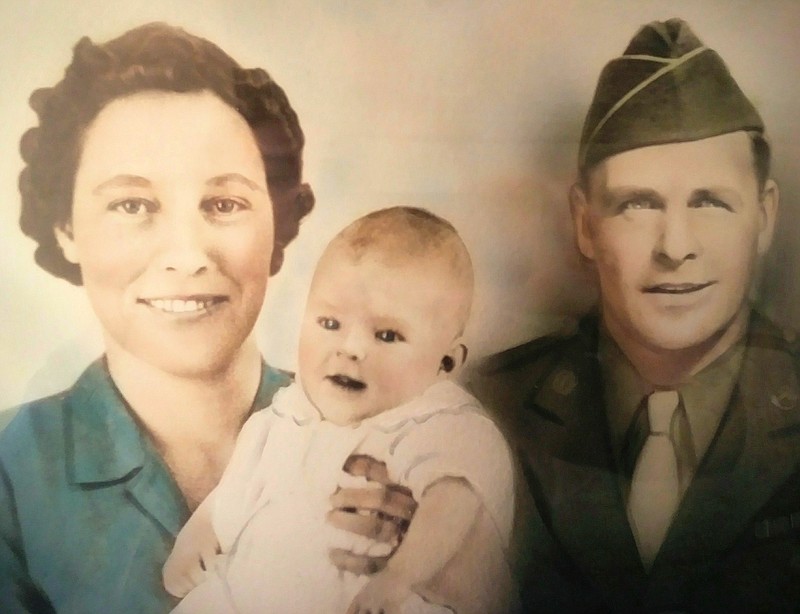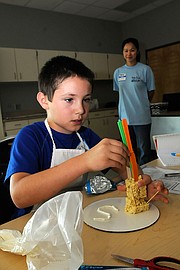Joan Stubinger was little more than a year old when her father, William Lee Beaman, was killed in action while serving with the Army in World War II. Though her mother, who is now deceased, shared with her some memories of her father throughout the years, she wishes to know more about his time in the military so she can share his story with her own son, who is an Army and National Guard veteran.
Born June 24, 1910, in the Howard County community of New Franklin, William Beaman married the former Pauline Moehle at the Evangelical Church Parsonage in Boonville on June 1, 1938.
"In his early years, he worked in some kind of factory in Boonville, where my mother was from," Stubinger recalled. "After they married, there wasn't a lot of work so my mother's brother - my uncle - convinced them to move to Kansas City because he said there was plenty of work available there."
According to Stubinger, while living in Kansas City, her father was employed locally while her mother worked at the Lake City Army Ammunition Plant, where small caliber ammunition was manufactured for the Army. However, when it was discovered her mother was pregnant, her supervisors at the plant let her go.
Stubinger was born in September 1943 and shortly thereafter, her father received notice he was to be inducted into the Army for service in World War II.
"My parents then decided to move back to Boonville so that mother and I could live with her parents while my father was away from home serving in the military."
Records accessed through the National Archives and Records Administration indicate Beaman was inducted as a private into the Army at Jefferson Barracks on Oct. 20, 1943. It would not be long until the new draftee was assigned to Company B, 318th Infantry Regiment of the 80th Division.
In the months prior to Beaman's induction, the 80th Division left their home station of Camp Forrest, Tennessee, to train with the 83rd Division at the Tennessee Maneuver Area south of Murfeesboro, Tennessee. From there, they traveled to Camp Phillips, Kansas, in late August 1943, where Beaman met up with the division.
"Range firing and grueling marches highlighted the three months' stay" at Camp Phillips, as was written in a divisional history. "Nov. 17, the division once more pulled up the stakes this time it was the California-Arizona Maneuver Area" - a desert training area located in southeastern California and western Arizona that was established in 1942 to prepare soldiers in desert warfare tactics.
In the months that followed, Beaman and the soldiers of the division participated in training exercises near Palen Pass followed by artillery testing at Iron Mountain, California. Their preparatory exercises ended in early April 1944, when the division, following a short stay at Ft. Dix, New Jersey, traveled to Camp Kilmer, New Jersey, to board troop ships bound for overseas service.
The official history of the 80th Division further explains on Aug. 3, 1944, "less than one month after landing in the British Isles, the 80th found itself for the second time on French soil (the first time being in WWI), ready to assist in the destruction of the new German dream of world domination."
Entering France through Utah Beach, the division pushed the Germans westward, capturing cities and following "in the wake of the 4th Armored Division to cross the Meuse River at Commercy" on Sept. 1, 1944, as is noted in the book "World War II Order of Battle."
The division met strong opposition in the weeks that followed and incurred significant casualties during German counterattacks. Yet it would be within days of the division crossing the Seille River in the early part of November that Beaman would lose his life in combat.
According to a report submitted by Capt. Edward Hueske, who at the time was serving in 1st Battalion of the 318th Infantry Regiment, on Nov. 11, 1944 "the (Battalion) jumped off with the mission of taking Morville (Morville-sur-Seille is a small community in northeastern France)."
Hueske went on to report, "Heavy resistance was met in Bois Juville woods. Some 15 casualties were suffered while fighting in the woods." Sadly, the 34-year-old William Beaman was one of the soldiers killed in action during this encounter.
"I was very young but I can remember my mother sitting on the edge of the bed and crying," Stubinger recalled. "I somehow knew that she was mourning my father."
Private First Class Beaman was laid to rest in the Lorraine American Cemetery near Saint-Avold, France. "A Protestant Chaplain held the grave-side service, and a Christian cross, bearing the pertinent information of the deceased, marks the grave," wrote John W. Osberg, chaplain with the 318th regiment, in a letter to Stubinger's mother dated Jan. 10, 1945.
Stubinger's mother remarried in 1963 and passed away at 97 years of age in 2009. As her daughter went on to explain, with her mother now gone, there remains no connection to her father but she is satisfied in knowing some of the details of his military experience.
"My mother told me that she was given the choice of leaving my father's body in France or bringing him back home but she decided to leave him there because she would never really know for sure whether it was his body in the casket."
With heavy pause, Stubinger added, "I was always told that my father was on the front lines of combat but never really knew the circumstances of how he was killed. I've thought about this for quite some time and it was important not only for me to know, but to be able to share it with my son."
Jeremy P. Amick writes on behalf of the Silver Star Families of America.


